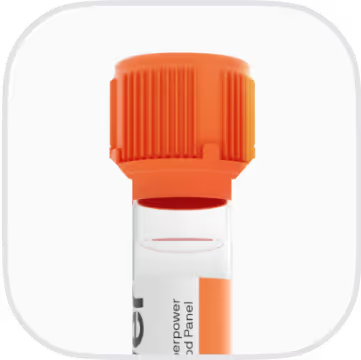What are Addison’s Disease biomarkers
Addison’s disease biomarkers are blood signals that map how well the adrenal glands and their control system are working. They show whether the adrenals can make stress hormone, salt-balancing hormone, and androgens, and how hard the brain is pushing them. Cortisol reflects the adrenals’ capacity to sustain energy, blood pressure, and stress responses; adrenocorticotropic hormone (ACTH) reflects pituitary drive to the adrenals. Aldosterone tracks salt and water regulation, while renin shows how the kidneys respond when aldosterone signaling falters. Sodium and potassium reveal the downstream effects of mineral balance. Adrenal androgens such as dehydroepiandrosterone sulfate (DHEA-S) mark the adrenals’ broader hormone output. Autoimmune markers—especially 21-hydroxylase autoantibodies—identify the most common cause, autoimmune adrenalitis. Together, these biomarkers help confirm adrenal insufficiency, distinguish adrenal failure from pituitary causes, uncover the underlying driver, and guide treatment and follow-up. In short, they turn vague symptoms like fatigue, weight loss, salt craving, and dizziness into a clear picture of adrenal biology, enabling precise diagnosis and monitoring.
Why is blood testing for Addison’s Disease important?
- Check adrenal function for Addison’s disease by assessing cortisol and key electrolytes.
- Spot early adrenal hormone shortage with low morning cortisol suggesting insufficiency.
- Flag mineralocorticoid loss when sodium runs low and potassium rises.
- Clarify fatigue, dizziness, salt craving, nausea, and weight loss as adrenal-related.
- Guide urgent action if severely low sodium or high potassium suggests crisis risk.
- Direct treatment choices for steroid doses and salt needs using electrolyte trends.
- Best interpreted with morning testing, ACTH, renin/aldosterone, and ACTH stimulation test plus symptoms.
- Support safer pregnancy by optimizing steroid dosing and electrolytes before and during pregnancy.
What insights will I get?
Addison’s Disease blood testing is essential for understanding how well your adrenal glands are supporting your body’s core systems. The adrenal glands produce hormones that help regulate energy, blood pressure, metabolism, immune response, and even mood. When these glands underperform, as in Addison’s Disease, the effects ripple through nearly every organ system. At Superpower, we focus on three key biomarkers for Addison’s Disease: Cortisol, Sodium, and Potassium.
Cortisol is the main hormone produced by the adrenal cortex and is vital for stress response, blood sugar regulation, and maintaining blood pressure. In Addison’s Disease, cortisol levels are typically low, which can lead to fatigue, low blood pressure, and impaired stress tolerance. Sodium and Potassium are electrolytes controlled in part by another adrenal hormone, aldosterone. In Addison’s Disease, sodium levels often drop while potassium rises, reflecting the body’s inability to balance fluids and electrolytes.
Healthy levels of cortisol, sodium, and potassium are crucial for stability in blood pressure, hydration, and cellular function. When these markers are out of range, it signals that the body’s systems are struggling to maintain equilibrium, which can affect everything from heart rhythm to mental clarity.
Interpretation of these biomarkers can be influenced by factors such as acute illness, pregnancy, certain medications (like steroids or diuretics), and age. Laboratory methods and reference ranges may also vary, so results are best understood in context.







.avif)



.svg)





.svg)


.svg)


.svg)

.avif)
.svg)










.avif)
.avif)
.avif)


.avif)
.avif)




.svg)




.avif)


